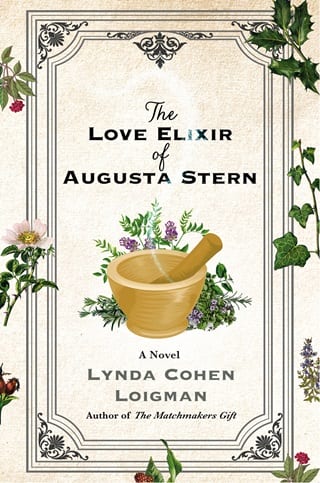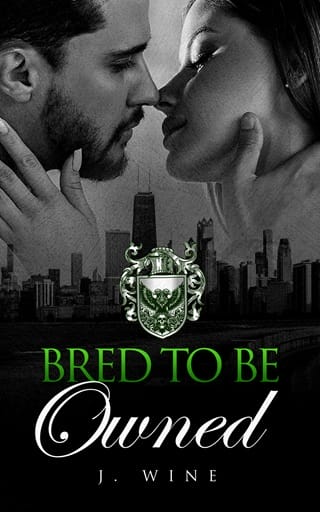Chapter Forty-Five
FORTY-FIVE
OCTOBER 1987
Jackie made her aunt a fresh cup of coffee and insisted she sit down to drink it.
“Aunt Augusta, you must know by now that Esther’s death wasn’t your fault. My mother told me how sick she was. She was ninety-two years old, with congestive heart failure. There was nothing anyone could do.”
“Thank you, sweetheart,” Augusta said. “Part of me knows that now, of course, but sometimes it’s still hard for me to believe.” She took a few sips from her mug until the ache in her chest faded and she was ready to talk. “When Irving left, I was devastated. But when Esther died… I felt as if all the magic in my life died with her. I felt like I wasn’t worthy of her tools—the apothecary case, the mortar, the pestle. I felt like they weren’t meant for me. That was why I couldn’t accept them. I didn’t realize that your mother had saved them for all these years.”
“Aren’t you even the least bit tempted to use them? Aren’t you curious about what might happen?”
“Why would I want to take that risk? Remember, the last time I made that elixir, the man I loved married someone else.”
But Jackie would not be discouraged. “As I see it, the worst has already happened. What more is left for there to go wrong? You and Irving stay apart for sixty more years? You’ve already been burned, Aunt Augusta. This time, you don’t have anything to lose.”
“I don’t know,” Augusta objected. But even as she protested, she was also curious. “Is that why you made the soup today? To try to convince me?”
“I thought it might put you in the right frame of mind,” Jackie said. “You know, bring you back to Esther’s kitchen in Brooklyn.”
Augusta looked back at the mortar and pestle. This time, her expression softened. “The last time I used those, I wasn’t honest with Irving. I didn’t tell him what I put in the flask. If I do this again, it would have to be different. This time, I would have to tell him everything.”
Jackie grinned. “Does that mean we can get started?”
For the rest of the morning, they were busy preparing. Augusta sent Jackie back to the store for candles and a package of egg noodles. In the meantime, she cut up an old cloth napkin to make something resembling Esther’s muslin squares. When Shirley stopped by with some cherry Danish, Augusta took the string from the bakery box, cut a piece, and put it aside.
Once Jackie was back, Augusta added carrots and parsley to the pot. When something about the soup still didn’t seem right, she added dried rosemary from Esther’s apothecary case. Ten minutes later, her apartment smelled exactly like Esther’s kitchen. At last, Augusta turned down the flame on the soup pot and smiled.
She had neither the time nor the skill to make Esther’s famous kreplach, but she added egg noodles to the pot and let them simmer in the broth. By the time the soup was finished, her mouth was watering.
The taste was everything she remembered—rich and salty and full of flavor. One spoonful, and she was back in Brooklyn, listening to the sounds of the crowded avenue wafting in through their open windows: children playing stickball, men selling peanuts, babies crying for their mothers. She could see her father reading his morning paper across from her at the breakfast table; she could smell Bess’s lavender perfume. She could hear Esther humming as she worked.
For a moment, Augusta could remember what it felt like to believe—not in the magic of witches or fairies, but in the magic of women who knew how to heal; the magic of women in the quiet of their kitchens, who could sweeten a bitter woman’s heart or soothe a man’s temper with a cup of tea. The ones who knew how to bring down a fever, assuage a toothache, or quiet a child with nothing more than a spoonful of honey, a gentle hand, and a few whispered words.
After they’d eaten, Augusta was resigned. She did not know whether she would remember Esther’s recipe or whether the proper melody would find its way to her lips. She did not know how she would explain the strange elixir or its purpose to Irving. Even if she did manage to explain it, she did not know whether he would agree to drink it. She had no way of knowing whether her eightieth birthday would mark a joyful and fresh beginning or whether the sorrows of her past would be repeated a second time.
There was only one way to find out.
Esther had always worked after midnight in order to avoid attracting the attention of Augusta’s father. But Augusta’s work would now be done in the broadest light of day.
She drew her curtains shut against the sunshine, but light escaped around the edges, filling the apartment with an uneven glow. Though the candles weren’t necessary, she lit them for old times’ sake. The smell of soup lingered in the air; the atmosphere was almost dreamlike. Augusta’s eighty-year-old bones felt as if they were eighteen again.
From inside the apothecary case, Augusta chose her ingredients and formed a small pile of what she required. She whispered the names the way Esther had done. Fenugreek seeds, mandrake root, sage leaves, dried rose hips, and chamomile. From the depths of the case, Augusta searched for the final ingredient—the tiny raskovnik that Esther had showed her all those years ago.
What was it that Esther had said of the plant? They say the leaves can unlock emotions. Augusta turned the case around and opened the fitted back panel. Her finger found a tiny groove in the wood revealing an almost invisible drawer. Inside was a tiny stoppered bottle with a single green clover preserved inside. She did not know whether it had been left by her aunt or replaced by the diligent homeopath, but she supposed it did not matter.
As she ground the ingredients in the mortar, her thoughts turned to a long-buried memory—a day on Coney Island, after her mother took ill—the one time her father had joined them at the beach. In her mind, Augusta heard her mother’s laugh as the water lapped at her feet. Augusta focused on those two sounds—the laughter in the air and the waves on the sand. A tune came to her then from a place beyond words, from a place filled with all the love she had lost.
To ease the pain of those who suffer
To repair the bodies of those who are ill
To restore the minds of those in need
Augusta sang for all the years she had wasted, for all the love she had wanted to give. She sang for the past and for the present, for all the mistakes she had made.
When she was done, Augusta knew the powder was perfect. She knew it would do what she had asked. Irving’s answer, of course, would depend on him—it was something she could not control. But as she tied up the pouch with the bakery string, she decided that, for the first time in years, she felt as if there might just be a bit of magic left in the world.
A few hours later, Augusta put on her new dress and a pair of heels she hadn’t worn since New York. After she applied her makeup, the only thing left to deal with was her purse—a silver clutch that she filled with everything she needed for the evening: Altoids, aspirin, lipstick, keys. And of course the small fabric pouch tied with cotton string…
They were a few minutes early pulling into Shirley’s driveway, but Shirley was already waiting outside. The sky was a mélange of blues, pinks, and a ripe, vibrant orange. Soon, Augusta thought, the sun will set, and my birthday will be over. She wondered whether she would be brave enough to carry out the task she had set for herself.
“Augusta!” Shirley practically shouted. “You look absolutely stunning!” Before she slid into the car’s back seat, Shirley opened the passenger-side door to get a better look at Augusta’s dress. “Jackie, you can shop for me anytime.”
“I don’t think you need my help. That’s a great dress you’ve got on.”
“I picked this one up when I took Augusta shopping. I brought it into the dressing room for her, but she insisted that the neckline was too low.”
Augusta tried not to roll her eyes. “Not all of us are blessed with your confidence, Shirley.”
“Or my décolletage.”
As Jackie drove, Augusta told Shirley about the bouquet of flowers from Irving and Nathaniel. “They called a truce,” Augusta said. “Can you believe it?”
“Oh, I believe it all right. Irving was having a conniption over what to get you for your birthday. I told him that the best gift would be to call off his war with Nathaniel. Thank goodness I finally convinced him.”
“Did you convince Nathaniel, too?” asked Jackie.
“I’m sure Nathaniel didn’t need convincing.” Shirley’s voice grew wistful. “Though it sure would have been fun to try.”
Augusta sat up straighter in her seat. “Shirley! Do you have feelings for Nathaniel? I thought there might be something going on! Why didn’t you say anything before?”
“I wanted to,” said Shirley, “but I was too nervous. When you first moved here, I thought for sure that Nathaniel had his eye on you. I didn’t want to interfere. But now that you and Irving are together—”
“We’re not together,” Augusta clarified.
“Not yet, ” Jackie added.
“So much intrigue,” Shirley chuckled. “See, Jackie? I told you Augusta spices up this place. Anyway, now that Irving and Nathaniel are friends, we can all have a nice, peaceful evening. Augusta can celebrate her birthday dinner without any unnecessary drama.”
Augusta thought about the pouch of powder in her purse. “We’ll have to see about that,” she said.
 Fullepub
Fullepub 



